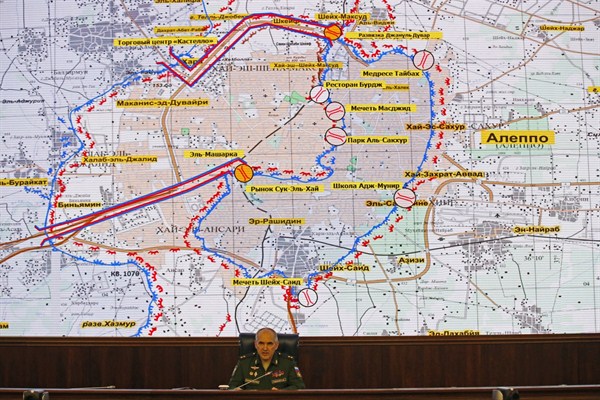Does Moscow care at all about international declarations of outrage over its behavior in Syria? Could threats of legal action against Russian officers involved in the siege of Aleppo affect their decisions? Over the past week, Western and Arab diplomats made a concerted push to shame Russia and the Syrian regime into curtailing their operations in Aleppo, with a flurry of meetings and statements in Brussels, New York and Geneva. But it is not clear that President Vladimir Putin and his advisers take all this sound and fury very seriously. The crisis may just exacerbate splits between Western and non-Western powers over the future of international justice.
Meeting in Brussels at the end of last week, European Union leaders criticized Russia for the “current atrocities” in Syria, but made only a mild threat of potential sanctions. In Geneva, Britain initiated an emergency session of the U.N. Human Rights Council that authorized a special inquiry into the situation in Aleppo—over Russian objections. In New York, Canada led a group of 69 states to call a special session of the General Assembly to discuss how to deal with Syria while the Security Council is deadlocked.
There is talk of the General Assembly launching a new mechanism for gathering detailed evidence of war crimes in Syria, buttressing existing human rights inquiries and potentially laying the groundwork for future war crimes trials of officials from Syrian President Bashar al-Assad’s regime, and their Russian counterparts. But any serious legal action is hypothetical for now. Moscow vetoed a French-led effort to refer Syria to the International Criminal Court in 2014. Last week’s talk of sanctions and future war crimes trials did appear to ruffle the Russians a little, and Moscow and Damascus declared a short-term “humanitarian pause” in Aleppo. But they have since returned to the offensive, and Western officials believe that they will ramp up their attacks further.

